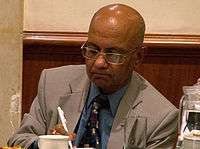Kul Gautam

Kul Chandra Gautam is a former Assistant Secretary-General of the United Nations, and Deputy Executive Director of UNICEF. He has extensive experience in socio-economic development, humanitarian assistance, human rights and international diplomacy. As a senior UN official, Gautam provided leadership for strategic planning, policy guidance and programme management. He coordinated inter-agency collaboration and public-private partnerships for child rights and human development among UN agencies, donors and civil society organizations.[1]
In his long and distinguished career with the United Nations, spanning over three decades, Gautam has had extensive dealings with senior levels of donor governments, development agencies, NGOs and the corporate sector in policy dialogue, advocacy and resource mobilization.[2]
At the global level, Gautam dealt with the highest levels of policy making at the United Nations, including the General Assembly, Security Council, ECOSOC and the UNICEF Executive Board. He oversaw UNICEF cooperation in over 150 developing countries. Gautam had hands-on experience at the field level, serving UNICEF in positions of increasing responsibility and leadership in Cambodia, Indonesia, Laos, Haiti and India. He also served as Chief for Latin America and the Caribbean, as Regional Director for Asia and the Pacific, and as Director for Planning and Programme at UNICEF Headquarters.[3]
Gautam was the key senior UNICEF officer responsible for drafting the Declaration and Plan of Action of the 1990 World Summit for Children, the largest gathering of world leaders in history until that time. In 2002 he led the organization of another major United Nations conference - the Special Session of the General Assembly on Children.[4]
Gautam has served as chair or member of the boards of several international development organizations and public-private partnerships, including the Partnership for Maternal, Newborn and Child Health (PMNCH), the Micronutrient Initiative (MI), the Global Alliance for Vaccines and Immunization (GAVI), the Global Alliance for Improved Nutrition (GAIN), the Global Network of Religions for Children (GNRC), and the Inter-faith Council for Ethics Education. He is the winner of several awards, including the Audrey Hepburn Humanitarian Award (2008).[5]